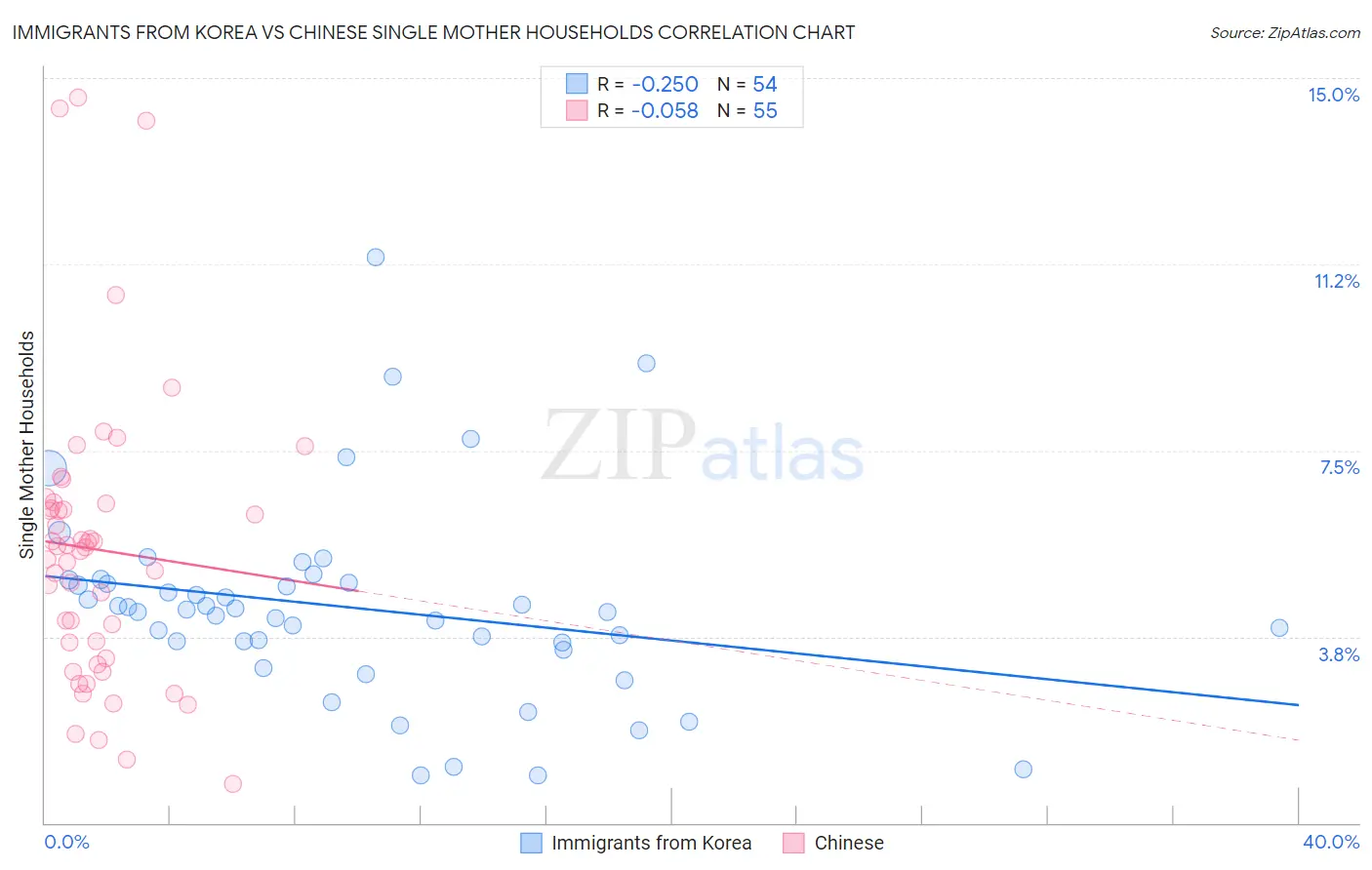Immigrants from Korea vs Chinese Single Mother Households
COMPARE
Immigrants from Korea
Chinese
Single Mother Households
Single Mother Households Comparison
Immigrants from Korea
Chinese
5.3%
SINGLE MOTHER HOUSEHOLDS
99.7/ 100
METRIC RATING
31st/ 347
METRIC RANK
5.2%
SINGLE MOTHER HOUSEHOLDS
99.9/ 100
METRIC RATING
19th/ 347
METRIC RANK
Immigrants from Korea vs Chinese Single Mother Households Correlation Chart
The statistical analysis conducted on geographies consisting of 414,811,285 people shows a weak negative correlation between the proportion of Immigrants from Korea and percentage of single mother households in the United States with a correlation coefficient (R) of -0.250 and weighted average of 5.3%. Similarly, the statistical analysis conducted on geographies consisting of 64,782,861 people shows a slight negative correlation between the proportion of Chinese and percentage of single mother households in the United States with a correlation coefficient (R) of -0.058 and weighted average of 5.2%, a difference of 2.4%.

Single Mother Households Correlation Summary
| Measurement | Immigrants from Korea | Chinese |
| Minimum | 0.95% | 0.78% |
| Maximum | 11.4% | 14.6% |
| Range | 10.4% | 13.8% |
| Mean | 4.3% | 5.5% |
| Median | 4.3% | 5.5% |
| Interquartile 25% (IQ1) | 3.6% | 3.3% |
| Interquartile 75% (IQ3) | 4.8% | 6.4% |
| Interquartile Range (IQR) | 1.2% | 3.1% |
| Standard Deviation (Sample) | 2.0% | 2.9% |
| Standard Deviation (Population) | 2.0% | 2.9% |
Demographics Similar to Immigrants from Korea and Chinese by Single Mother Households
In terms of single mother households, the demographic groups most similar to Immigrants from Korea are Burmese (5.3%, a difference of 0.0%), Cambodian (5.3%, a difference of 0.010%), Latvian (5.3%, a difference of 0.070%), Russian (5.3%, a difference of 0.080%), and Bhutanese (5.3%, a difference of 0.18%). Similarly, the demographic groups most similar to Chinese are Immigrants from Armenia (5.2%, a difference of 0.11%), Maltese (5.2%, a difference of 0.47%), Eastern European (5.2%, a difference of 0.53%), Soviet Union (5.1%, a difference of 0.88%), and Indian (Asian) (5.1%, a difference of 1.1%).
| Demographics | Rating | Rank | Single Mother Households |
| Immigrants | Eastern Asia | 99.9 /100 | #15 | Exceptional 5.1% |
| Indians (Asian) | 99.9 /100 | #16 | Exceptional 5.1% |
| Soviet Union | 99.9 /100 | #17 | Exceptional 5.1% |
| Immigrants | Armenia | 99.9 /100 | #18 | Exceptional 5.2% |
| Chinese | 99.9 /100 | #19 | Exceptional 5.2% |
| Maltese | 99.9 /100 | #20 | Exceptional 5.2% |
| Eastern Europeans | 99.8 /100 | #21 | Exceptional 5.2% |
| Thais | 99.8 /100 | #22 | Exceptional 5.2% |
| Immigrants | Austria | 99.8 /100 | #23 | Exceptional 5.2% |
| Armenians | 99.8 /100 | #24 | Exceptional 5.2% |
| Immigrants | Japan | 99.8 /100 | #25 | Exceptional 5.2% |
| Immigrants | Lithuania | 99.8 /100 | #26 | Exceptional 5.3% |
| Bhutanese | 99.7 /100 | #27 | Exceptional 5.3% |
| Russians | 99.7 /100 | #28 | Exceptional 5.3% |
| Latvians | 99.7 /100 | #29 | Exceptional 5.3% |
| Burmese | 99.7 /100 | #30 | Exceptional 5.3% |
| Immigrants | Korea | 99.7 /100 | #31 | Exceptional 5.3% |
| Cambodians | 99.7 /100 | #32 | Exceptional 5.3% |
| Immigrants | Switzerland | 99.7 /100 | #33 | Exceptional 5.3% |
| Bulgarians | 99.7 /100 | #34 | Exceptional 5.3% |
| Immigrants | Northern Europe | 99.7 /100 | #35 | Exceptional 5.3% |